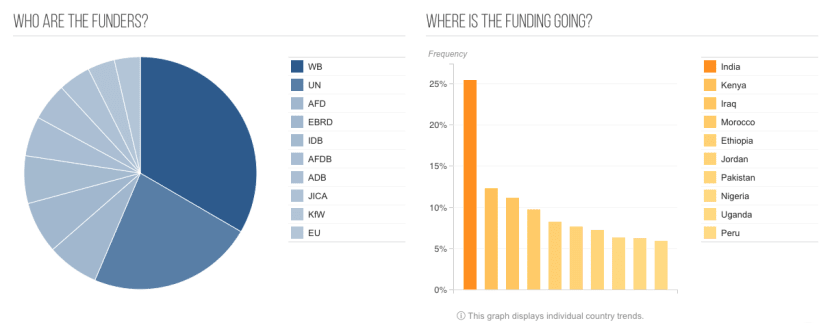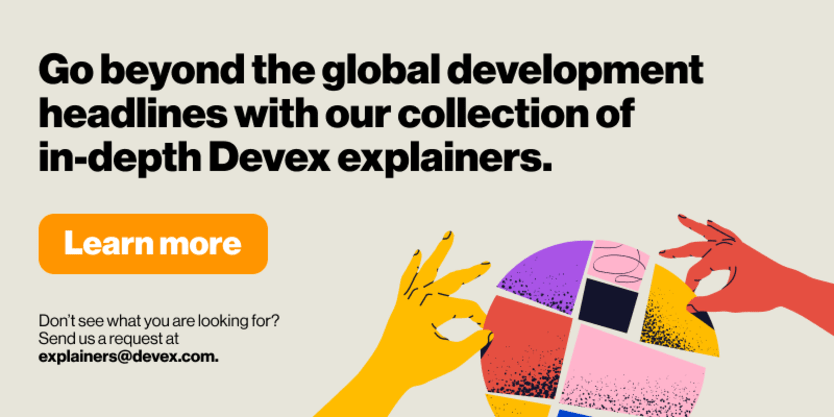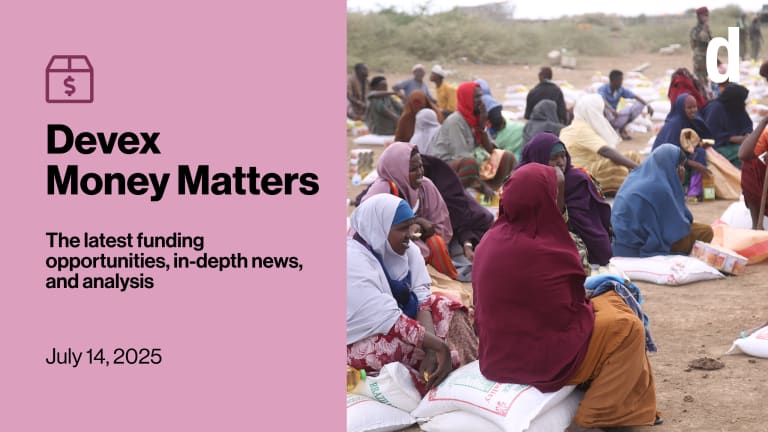
Understanding how donor resources translate into tender and grant opportunities can go a long way for your organization, from finding the right market to increasing your chance of success in competitive bidding processes.
As a prospective implementer, you should know the context in which a program will be carried out before designing a project or preparing proposals. It is just as important to know the competition and seek out potential partners that could help your organization win contracts.
Aid agencies follow a system to identify priorities, allocate funding, release tender and grant opportunities, and award contracts.
Keep reading for five steps to help your organization master the intricacies of development funding and win donor financing — and how the Devex platform can help.
Understand the funding trends
The Devex funding overview page offers a hub for interactive funding data analyses that cover the latest in forecasted funding announcements, analysis of past contractor data, and specific analysis on significant programs, emerging donors, and funding instruments. Understanding how funding is being spent by the top aid providers is essential when building a solid business development strategy.
While donor agencies follow similar practices in budget allocation and project implementation, several factors affect the way they set funding priorities. These could include regional or global events such as economic recession, an ongoing health crisis, the onset of natural or man-made disasters, realignment of government policies, budget cuts, and more.
1. Early insights on funding and donor priorities
Funders and organizations share information regarding future funding opportunities and priorities through many different channels, making it challenging and time-consuming to keep up with. The Devex funding activity database brings this content — sourced from press releases, donor country strategy reports, forecast updates, and insights from our team — together in one searchable database.
Organizations use it to discover insights on new funding announcements, partnerships, and initiatives in order to remain up to date on the broader trends that might impact their strategic priorities, and also on new opportunities in advance of the formal bidding stage. While not at the proposal stage, you can still act on these reports by connecting with in-country donor representatives and potential partners to better position your organization in advance of the tender or grant application stage.
Before donor agencies determine what type of projects they need to design and implement, a significant amount of planning takes place in order to determine where their resources would create the most impact. In these preparatory stages, aid agencies undertake a number of fact-finding activities such as consultations with government bodies, civil society and NGOs, the private sector, and other relevant stakeholders. They also do risk assessments and performance evaluations of past projects and development strategies to better inform future allocations. The country operational plans and country strategies are a good source of information following this phase.
2. Understand the current tender and grant context
Devex allows you both to track funding opportunities and understand the current trends in open tenders and grants. The ability to visualize the search results on the funding database means you can easily understand the top key funders and country recipients according to a given sector of interest. Many organizations use the funding search to get an overview of what donors have funded in the past by looking at closed funding opportunities historically. This analysis allows you to better understand your space and in doing so align your organization’s interests with the right funder before beginning to pursue procurement opportunities.

3. Identify the programs
Once donor priorities have been set, development programs are designed in accordance with the identified goals. These projects vary in scale and can be implemented at the community, national, regional, or global level. Each project targets different components of the donor strategy and focuses on specific sectors.
Aid agencies can release information on these programs as early as the planning stage. This happens months before procurement planning, although not all projects require tendering procedures for implementation. Project documents typically contain information on the context of the program, activities to be supported, budget, timeline, and geographic scope. Familiarizing yourself with this data will allow you to anticipate upcoming tender and grant opportunities.
4. Find procurement opportunities
Devex’s database of tenders, grants, and open opportunities is updated daily including business opportunities from more than 450 donor funding sources. To find the opportunities and information you’re looking for within the Devex funding database, try using the Devex search platform. You can also sign up for Devex email alerts about relevant funding opportunities on a weekly or daily basis.
Organizations win funding by participating in competitive selection processes. These rigorous screening methods are employed by aid agencies in order to find the most cost-effective proposals from the most capable candidates. Ahead of these procedures, donors advertise tender and grant opportunities to invite prospective implementers to either submit bids or express interest in carrying out specific components of development projects. Devex offers practical advice on the procurement process related to certain funders.
The amount of time between publishing a procurement notice and the deadline for submission of proposals varies depending on the complexity of the tender. For smaller contracts, deadlines may arrive as soon as a few days after the release of the notice. For larger contracts, organizations could have up to several months to prepare their proposals. Either way, it is always advantageous for your organization to be informed of these procurement opportunities as soon as possible.
5. Know the key development players
Devex keeps track of contract awards and shortlists, providing a comprehensive list of winning organizations so you can identify key organizations in your field.
Once a winning organization has been selected, donor agencies publish a contract award. These documents typically contain information on the winning organization as well as the size and nature of the contract. In some cases, the aid agency also publishes a shortlist enumerating the top organizations they considered for funding.
Although the procurement process has ended by the time these documents are published, both contract awards and shortlists serve as valuable resources for organizations competing for donor funding. It is common for organizations to team up in order to increase competitiveness in selection procedures. By sharing expertise and pooling resources, organizations can increase their chance of being selected. This is especially beneficial for smaller organizations trying to win their first contract with a donor agency.
By looking at contract awards and shortlists and in-depth contract awardee analyses, your organization can understand the competition and learn more about potential partners.









